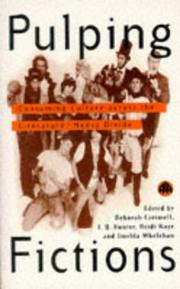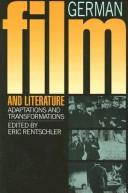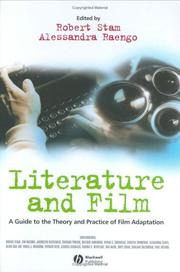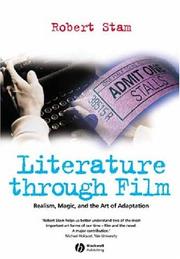| Listing 1 - 10 of 20 | << page >> |
Sort by
|
Book
ISBN: 9788478003297 Year: 2008 Publisher: Salamanca : Ediciones Universidad Salamanca
Abstract | Keywords | Export | Availability | Bookmark
 Loading...
Loading...Choose an application
- Reference Manager
- EndNote
- RefWorks (Direct export to RefWorks)
82.0 --- 791.43:82 --- 791.43:82 Film en literatuur --- Film en literatuur --- 82.0 Literatuurtheorie --- Literatuurtheorie

ISBN: 0745310702 Year: 1996 Publisher: London Pluto
Abstract | Keywords | Export | Availability | Bookmark
 Loading...
Loading...Choose an application
- Reference Manager
- EndNote
- RefWorks (Direct export to RefWorks)

ISBN: 0416603416 Year: 1986 Publisher: London Methuen
Abstract | Keywords | Export | Availability | Bookmark
 Loading...
Loading...Choose an application
- Reference Manager
- EndNote
- RefWorks (Direct export to RefWorks)
German literature --- Comparative literature --- Film --- German language --- Germany --- 791.43:82 --- #SBIB:309H1324 --- Film en literatuur --- Films met een amusementsfunctie en/of esthetische functie: film en literatuur --- Motion pictures --- 791.43:82 Film en literatuur

ISBN: 0521399130 Year: 1990 Publisher: Cambridge ; New York, NY : Cambridge University Press,
Abstract | Keywords | Export | Availability | Bookmark
 Loading...
Loading...Choose an application
- Reference Manager
- EndNote
- RefWorks (Direct export to RefWorks)

ISBN: 0631230548 0631230556 Year: 2005 Publisher: Malden (Mass.) : Blackwell,
Abstract | Keywords | Export | Availability | Bookmark
 Loading...
Loading...Choose an application
- Reference Manager
- EndNote
- RefWorks (Direct export to RefWorks)
Film --- Literature --- 82:791.43 --- 791.43:82 --- Literatuur en film --- Film en literatuur --- Film adaptations --- Motion pictures and literature. --- History and criticism. --- 791.43:82 Film en literatuur --- 82:791.43 Literatuur en film --- Motion pictures and literature --- Literature and motion pictures --- Moving-pictures and literature --- History and criticism
Book
ISBN: 9070289873 Year: 1991 Publisher: Brussel Vubpress
Abstract | Keywords | Export | Availability | Bookmark
 Loading...
Loading...Choose an application
- Reference Manager
- EndNote
- RefWorks (Direct export to RefWorks)
Literary semiotics --- Film --- Colloques --- Colloquia --- Films --- Films cinématographiques --- Letterkunde --- Littérature --- 791.43:82 --- 791.43 --- #SBIB:309H1324 --- Film en literatuur --- Filmkunst. Films. Cinema --- Films met een amusementsfunctie en/of esthetische functie: film en literatuur --- 791.43 Filmkunst. Films. Cinema --- 791.43:82 Film en literatuur --- Motion pictures and literature --- Congresses

ISBN: 0809321874 0809321866 Year: 1999 Publisher: Carbondale : Southern Illinois University Press,
Abstract | Keywords | Export | Availability | Bookmark
 Loading...
Loading...Choose an application
- Reference Manager
- EndNote
- RefWorks (Direct export to RefWorks)
When the 1990 English docudrama Who Bombed Birmingham? cast serious doubt on the guilt of six men convicted of bombing two British pubs in 1974, Prime Minister Margaret Thatcher declared that a "television program alters nothing." But, as Alan Rosenthal concludes, Thatcher was wrong. The film engendered a new inquiry that led to the release of the convicted men.Rosenthal notes that docudrama wields more influence than the average documentary and that "reality-based stories taken from topical journalism are the most popular drama genre on U.S. and British television today." This three-part collection of diverse and provocative essays addresses the dominant questions and controversies the genre poses.Defining and examining the rationale of docudrama, the nine essayists in the first part discuss the history and development of docudrama on TV and in film; they also consider the place of truth in docudrama, the main critiques of the form, and the audience's susceptibilities and expectations. In investigating the actual filmmaking process, the eight essays in the second part focus on how "docudrama as a 'commodity' is created in the United States and England." Part essay, part case study, and part interview, this section also explores how Hollywood and the commercial networks as well as producers and writers work and think. The final part presents an in-depth critique of a number of controversial docudramas that have helped form and shape public opinion, including Battleship Potemkin, Roots, Reds, JFK, Mississippi Burning, Schindler's List, and In the Name of the Father.In addition to Rosenthal, the contributors are John Corner, George F. Custen, David Edgar, Leslie Fishbein, George MacDonald Fraser, Todd Gitlin, Douglas Gomery, Richard Grenier, Sumiko Higashi, Tom W. Hoffer, Jerry Kuehl, Steve Lipkin, Yosefa Loshitsky, Ian McBride, Richard Alan Nelson, Conor Cruise O'Brien, Derek Paget, Robert A. Rosenstone, Betsy Sharkey, Irene Shubik, Jeff Silverman, D. J. Wenden, Sita Williams, and Leslie Woodhead.
#SBIB:309H1329 --- #SBIB:AANKOOP --- 791.43:82 --- Films met een informatieve functie (met inbegrip van de documentaire film) --- Film en literatuur --- Historical drama --- Historical films --- History and criticism. --- 791.43:82 Film en literatuur --- 799.5 --- docudrama --- documentaires --- filmgenres en -motieven, documentaire films --- History and criticism

ISBN: 140510287X 1405102888 9781405102889 9781405102872 Year: 2005 Publisher: Oxford Blackwell
Abstract | Keywords | Export | Availability | Bookmark
 Loading...
Loading...Choose an application
- Reference Manager
- EndNote
- RefWorks (Direct export to RefWorks)
Film --- Literature --- 82:791.43 --- 791.43:82 --- 791.43:82 Film en literatuur --- Film en literatuur --- 82:791.43 Literatuur en film --- Literatuur en film --- Film adaptations --- Motion pictures and literature --- Literature and motion pictures --- Moving-pictures and literature --- History and criticism --- Motion pictures and literature. --- History and criticism. --- Film adaptations - History and criticism
Book
ISBN: 9781444333848 1444333844 Year: 2010 Publisher: Chichester Wiley-Blackwell
Abstract | Keywords | Export | Availability | Bookmark
 Loading...
Loading...Choose an application
- Reference Manager
- EndNote
- RefWorks (Direct export to RefWorks)
The essays brought together in this book understand phobia not as a pathology, but as a versatile moral, political, and aesthetic resource – and one with a history. They demonstrate that enquiry into strong feelings of aversion has enabled writers and film-makers to say and show things they could not otherwise have said or shown; and in this way to get profoundly and provocatively to grips with the modern condition. The essays are arranged in such a way as to chart phobia's unfolding as a resource in literature and film since 1850. They pose the question ‘What does phobia know?’ in relation to a range of writers and film-makers: from Dickens, Thackeray, and George Eliot through Hardy, Zola, Joyce, Ford, Mansfield, and Woolf to Tony Harrison and Buchi Emecheta; from Jean Renoir through Hitchcock, Wyler, Kurosawa, and Truffaut to Margarethe von Trotta, Pedro Almodóvar, and Lynne Ramsay. They take issue in particular with the pre-eminent status the concept of trauma has recently acquired in cultural theory and cultural history. In so doing contribute to and re-shape the current preoccupation with ordinariness.
English fiction --- Motion pictures --- Phobias in literature --- Phobias in motion pictures --- Psychic trauma in literature --- Psychic trauma in motion pictures --- History and criticism --- 791.43:82 --- 791.43:82 Film en literatuur --- Film en literatuur --- History --- English fiction - History and criticism --- Motion pictures - History and criticism
Book
ISBN: 9001707424 Year: 1974 Publisher: Groningen : H. D. Tjeenk Willink,
Abstract | Keywords | Export | Availability | Bookmark
 Loading...
Loading...Choose an application
- Reference Manager
- EndNote
- RefWorks (Direct export to RefWorks)
Fiction --- Film --- literatuur --- film --- Literary semiotics --- semiotiek --- 82:791.43 --- 791.43:82 --- J.M. Peters --- filmtheorie --- film en literatuur --- narratologie --- Mauriac François --- Franju Georges --- Frankrijk --- filmmuziek --- 791.41 --- 778.5 --- 791.43 --- Filmische verteltechniek --- Literaire verteltechniek --- Romans : verfilming --- en literatuur --- Literatuur en film --- Film en literatuur --- 791.43:82 Film en literatuur --- 82:791.43 Literatuur en film --- CINEMA ET LITTERATURE --- MAURIAC (FRANCOIS), ECRIVAIN FRANCAIS, 1885-1970 --- ADAPTATIONS CINEMATOGRAPHIQUES ET TELEVISEES
| Listing 1 - 10 of 20 | << page >> |
Sort by
|

 Search
Search Feedback
Feedback About
About Help
Help News
News